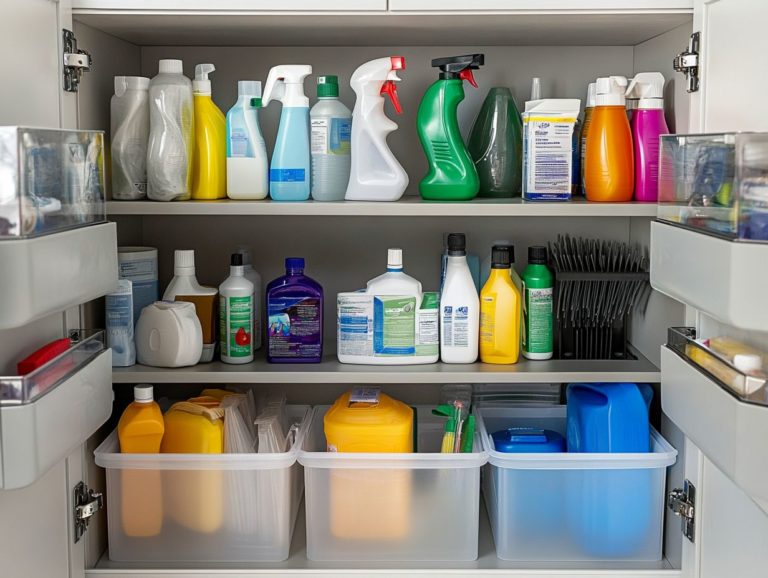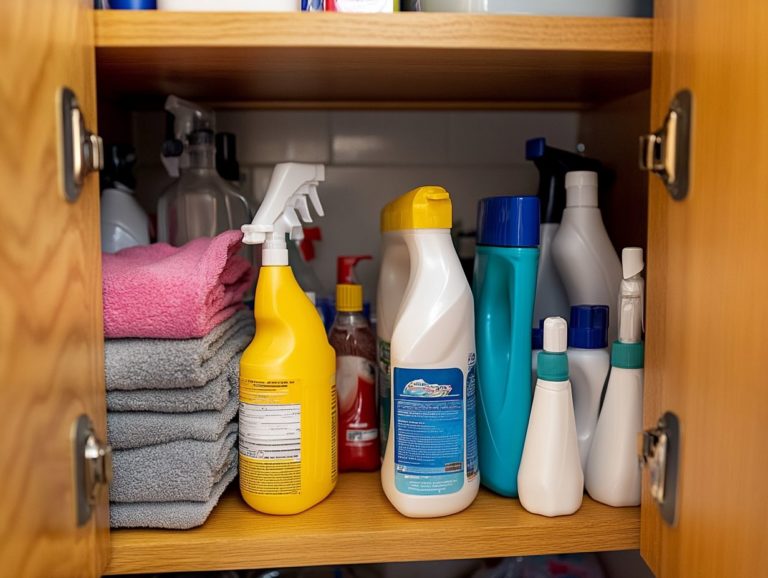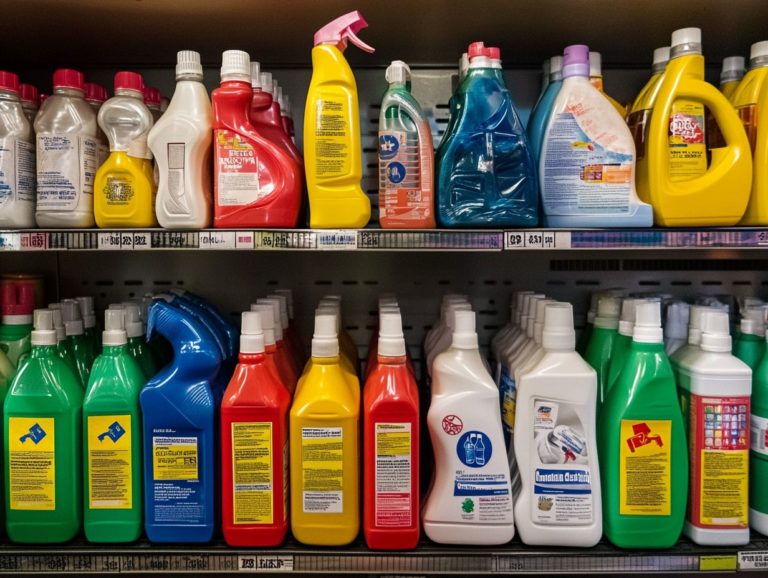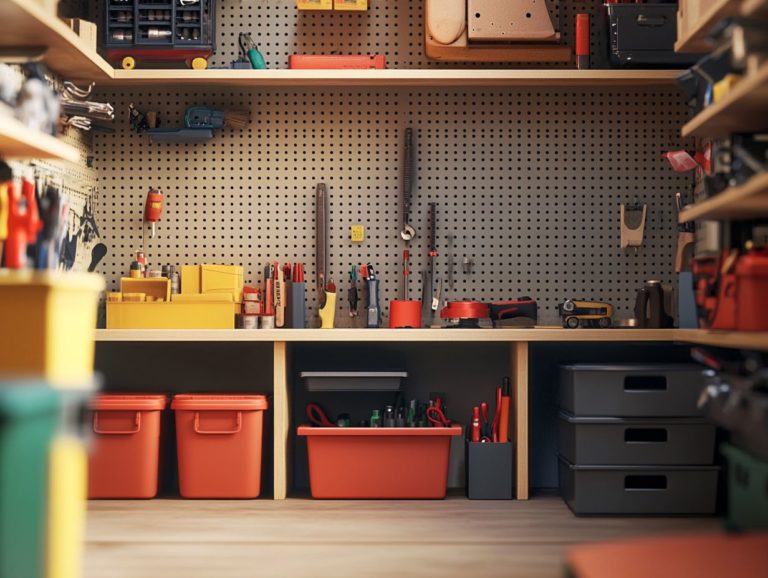Storing Cleaners Safely During Summer
The summer sun is blazing, and it s time to ensure your cleaning supplies are stored safely!
Improper storage can create significant risks, including harmful chemical reactions, fire hazards, and toxic fumes, all of which can jeopardize the safety of your family and home.
This guide delves into the importance of safe storage practices, equips you with effective tips to keep your cleaners secure, and offers valuable guidance on their safe usage during the warmer months.
Your journey toward a clean home, safety, and peace of mind begins here. Let s dive in to learn how to keep your home safe!
Contents
- Key Takeaways:
- Why Is It Important to Store Cleaners Safely During Summer?
- What Are the Risks of Improperly Storing Cleaners?
- How Can You Properly Store Cleaners During Summer?
- What Are Some Tips for Safe Usage of Cleaners During Summer Months?
- Your Questions Answered!
- How should I store cleaners safely during summer months?
- Can cleaners be stored in the refrigerator during summer?
- Are there any specific cleaners that need to be stored differently during summer?
- Should I keep cleaners out of reach of children during summer?
- How long can I store cleaners during summer before they expire?
- What should I do if a cleaner spills or leaks during summer storage?
Key Takeaways:
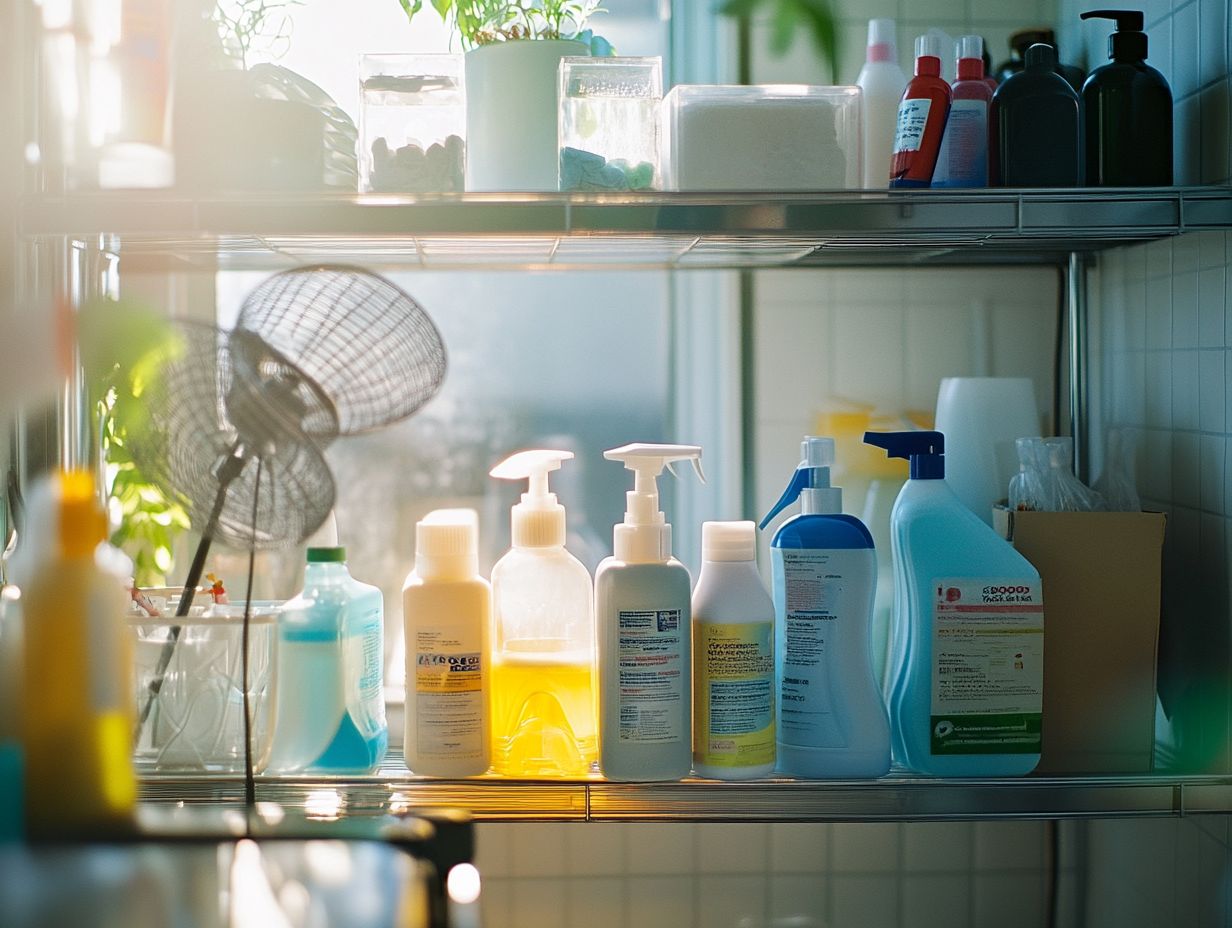
- Properly storing cleaners during summer is crucial to avoid potential risks such as chemical reactions, fire hazards, and toxic fumes.
- Keep cleaners in their original containers, store in a cool and dry place, away from direct sunlight, food and drinks, and out of reach of children and pets.
- When using cleaners during summer, always read and follow instructions, wear protective gear, use in well-ventilated areas, and dispose of them properly to ensure safety.
Why Is It Important to Store Cleaners Safely During Summer?
Storing your cleaning supplies safely during the summer months is essential for both maintaining a pristine home and safeguarding your household. The rising temperatures can heighten the tendency for chemicals to become unstable in many cleaning products, which can result in dangerous chemical reactions or the release of toxic fumes.
By implementing proper storage practices and adhering to Control of Substances Hazardous to Health (COSHH) regulations, you not only protect your family but also enhance your emergency preparedness. This proactive approach helps prevent accidents from improper handling of cleaning tools while ensuring secure and organized storage, making a safer environment for everyone in your home.
What Are the Risks of Improperly Storing Cleaners?
Improper storage of cleaning supplies presents a range of risks that could jeopardize the safety of your home and the well-being of everyone inside it. When cleaning products aren t stored correctly, they may react with other substances, generate toxic fumes, or even ignite, creating potentially dangerous situations. It s crucial to understand these risks to ensure the safe storage and use of your cleaning tools, particularly during the summer months when the tendency for chemicals to become unstable tends to rise significantly.
1. Chemical Reactions
Chemical reactions can occur when incompatible cleaning products are stored together or exposed to fluctuating temperatures, leading to potentially hazardous situations. Many common cleaning supplies contain volatile ingredients that, if mixed, can produce harmful fumes or even lead to explosions. This makes it crucial for you to ensure proper labeling and storage of your cleaning products.
For example, if you combine bleach with ammonia, you risk creating toxic chloramine vapors that pose serious health risks. Even mixing vinegar with baking soda, which seems harmless, can produce excessive foaming that may lead to spills and splashes, potentially resulting in burns.
To maintain safety, it s essential for you to keep an organized cleaning cabinet, clearly labeling each container to avoid confusion and accidents. Proper storage not only helps create a safe environment but also ensures that essential supplies are easily accessible when you need them, ultimately promoting effective housekeeping practices. Utilizing cabinet space efficiently with closet organizers, lazy Susans, and rolling carts can make a significant difference in maintaining a safe and clean home.
2. Fire Hazards
Fire hazards linked to cleaning supplies often arise from the flammable nature of certain products, including aerosol sprays and solvents, especially during the sweltering summer months. Improper storage of these items like keeping them too close to heat sources or in direct sunlight dramatically increases the risk of ignition, potentially leading to devastating fires.
Be mindful of the cleaning supplies that can pose these dangers! For example, products such as degreasers, bleach, and ammonia-based cleaners can trigger dangerous reactions if mixed or if aerosols are subjected to high temperatures.
To reduce these risks, always store these products in secured, ventilated spaces far removed from any potential ignition sources like stoves or heaters. Using cabinets designed for hazardous materials and conducting regular inventory inspections can significantly enhance safety. Utilizing shelf storage and vertical space effectively can also help keep these items safe and out of harm’s way.
3. Toxic Fumes
Toxic fumes can pose a significant risk when cleaning supplies are not stored properly, especially in enclosed spaces with poor ventilation. Many cleaning products emit harmful vapors that can lead to respiratory issues or other health problems if inhaled. Therefore, store these items in a cool, dry place, away from direct sunlight.
To identify hazardous products, always check for warning labels indicating corrosive, flammable, or toxic components. If a cleaning agent has a strong odor or lists ammonia, bleach, or other volatile chemicals (chemicals that can easily evaporate and may release harmful vapors) in its ingredients, it likely comes with heightened health risks.
To enhance safety in your home, use designated storage containers that are well-ventilated and keep these supplies out of reach of children. Regularly inspecting these items can help you prevent accidental leaks or spills, minimizing exposure to dangerous fumes. Using closet organizers and utility carts can help manage these supplies effectively, ensuring a secure location for each item.
How Can You Properly Store Cleaners During Summer?
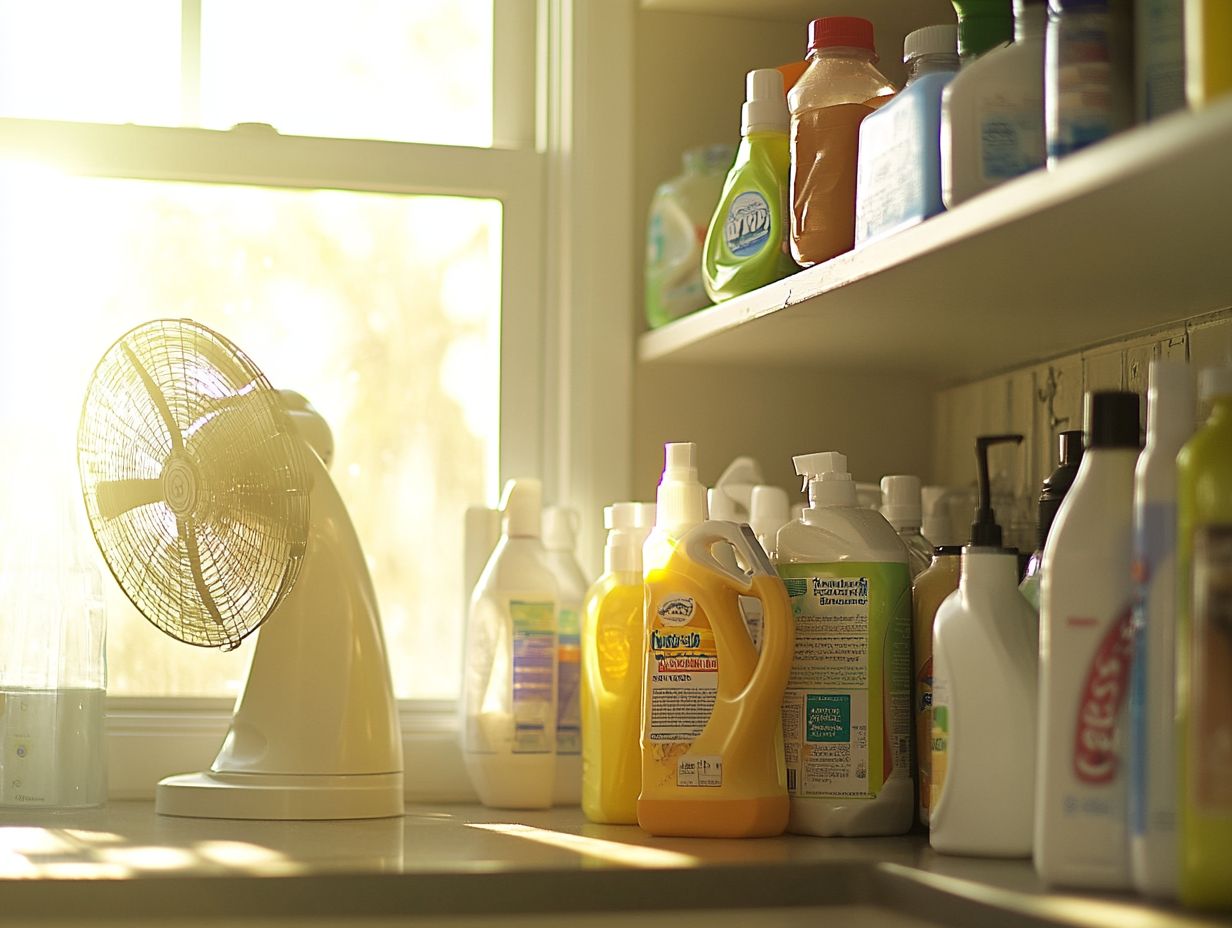
Proper storage of your cleaning supplies during the summer is crucial to prevent accidents and extend the life of your products. To maintain a pristine home and reduce the risk of hazardous chemical reactions, keep your cleaning products in their original containers, complete with clear labeling.
By storing these items in a cool, dry place away from direct sunlight, you preserve their effectiveness and safeguard your family from potential harm. For specific guidelines, check out how to store cleaners for winter. Utilizing air purifiers in storage areas can further enhance air quality and safety.
1. Keep Them in Their Original Containers
Keeping your cleaning supplies in their original containers is essential for maintaining safety and ensuring proper labeling. This practice allows you to easily identify hazardous chemicals and understand their usage instructions. Those original containers are specifically designed not only for effective storage but also to provide vital information regarding the safe handling of the products inside.
By using these containers, you significantly reduce the risk of potential accidents that could stem from miscommunication or mislabeling. Following the regulations for safe handling of chemicals requires that all substances are stored and labeled appropriately to minimize exposure risks.
To manage these containers effectively, regularly inspect them for any damages or leaks, ensuring that the seals remain intact. Establish a designated area for storing these supplies, separate from other household items, to enhance organization and accessibility while promoting a safer environment. For more detailed guidance, check out this article on how to store cleaners without risk.
Incorporating cleaning caddies or a rolling cart can help streamline your cleaning schedule, allowing you to efficiently move your supplies from one area to another while keeping them organized.
2. Store in a Cool, Dry Place
Storing your cleaning supplies in a cool, dry place is a vital practice. It prevents damage to products and reduces the risk of hazardous reactions caused by changes in temperature.
A stable environment preserves the integrity of your cleaning tools and maintains a safer household.
This careful approach significantly enhances the longevity and effectiveness of your products. It ensures they perform their intended functions without compromising safety.
Ideal locations for keeping these supplies include cabinets and closets, away from heat sources and moisture think garages or basements.
To maintain optimal conditions, use airtight containers to shield against humidity. Regularly check for expired items that need to be discarded.
Ensure good ventilation to reduce fumes and promote a healthier living environment for you and your loved ones.
Investing in organizers, a lazy Susan, or a utility cart can help maximize storage space and keep everything organized.
3. Keep Away from Direct Sunlight
It s vital to keep your cleaning products out of direct sunlight. Sunlight can damage the chemical compounds, diminishing their effectiveness and potentially releasing harmful fumes.
Store these supplies in shaded areas like cabinets or closets to preserve their integrity and safety.
Excessive sunlight exposure can lead to leaks or ruptures in containers, wasting valuable resources and presenting safety risks. To avoid these problems, use opaque storage bins or repurpose old shoeboxes to protect your products from light.
Keeping them in temperature-controlled environments, like indoors instead of in garages or sheds, safeguards their chemical stability.
By implementing these storage strategies, you ensure that your cleaning agents remain effective for their intended purposes. Minimize the dangers associated with compromised products by keeping everything organized.
4. Store Away from Food and Drinks
To maintain a clean home, always keep cleaning supplies separate from areas where food and drinks are stored or prepared. Keeping your cleaning supplies separate from food is a smart move that protects your family s health.
Use dedicated storage solutions, such as a rolling cart or cleaning caddies, to easily transport and organize your cleaning tools.
This precaution is necessary, as many cleaning agents contain toxic substances that can lead to serious health issues if ingested, even in small amounts.
Proper labeling and organized storage can help maintain a safe distance between cleaning products and consumables. For example, if a kitchen cleaning spray is on the same shelf as your spices, the risk of contamination increases.
It s wise to designate specific storage areas for your cleaning supplies. Ideally, keep them in a locked cabinet or on a high shelf out of reach of children.
Label cleaning products clearly and use child-proof containers to enhance safety. This allows you to maintain a clean home without compromising the well-being of everyone who lives there.
5. Keep Out of Reach of Children, Pets, and During Summer Months
Keeping cleaning supplies out of reach of children and pets is absolutely essential for ensuring their safety. Many cleaning products contain hazardous chemicals that can pose serious risks if ingested or mishandled.
By putting cleaning supplies in safe places, such as high cabinets, closet organizers, or locked containers, you can effectively prevent accidents and create a safer living environment for your family.
It’s also important to have open conversations with family members about the dangers associated with these products. Teaching children about the potential risks and encouraging them to respect the boundaries of storage areas fosters a sense of responsibility.
Utilizing special locks that only adults can open on cabinets can further enhance safety, ensuring that curious little hands remain out of reach. It s also wise to keep cleaning supplies in their original containers, complete with labels, to help everyone understand the contents inside.
Employing closet organizers and a lazy Susan can further aid in maintaining safe storage. Implementing these strategies will create a safer home for everyone!
What Are Some Tips for Safe Usage of Cleaners During Summer Months?
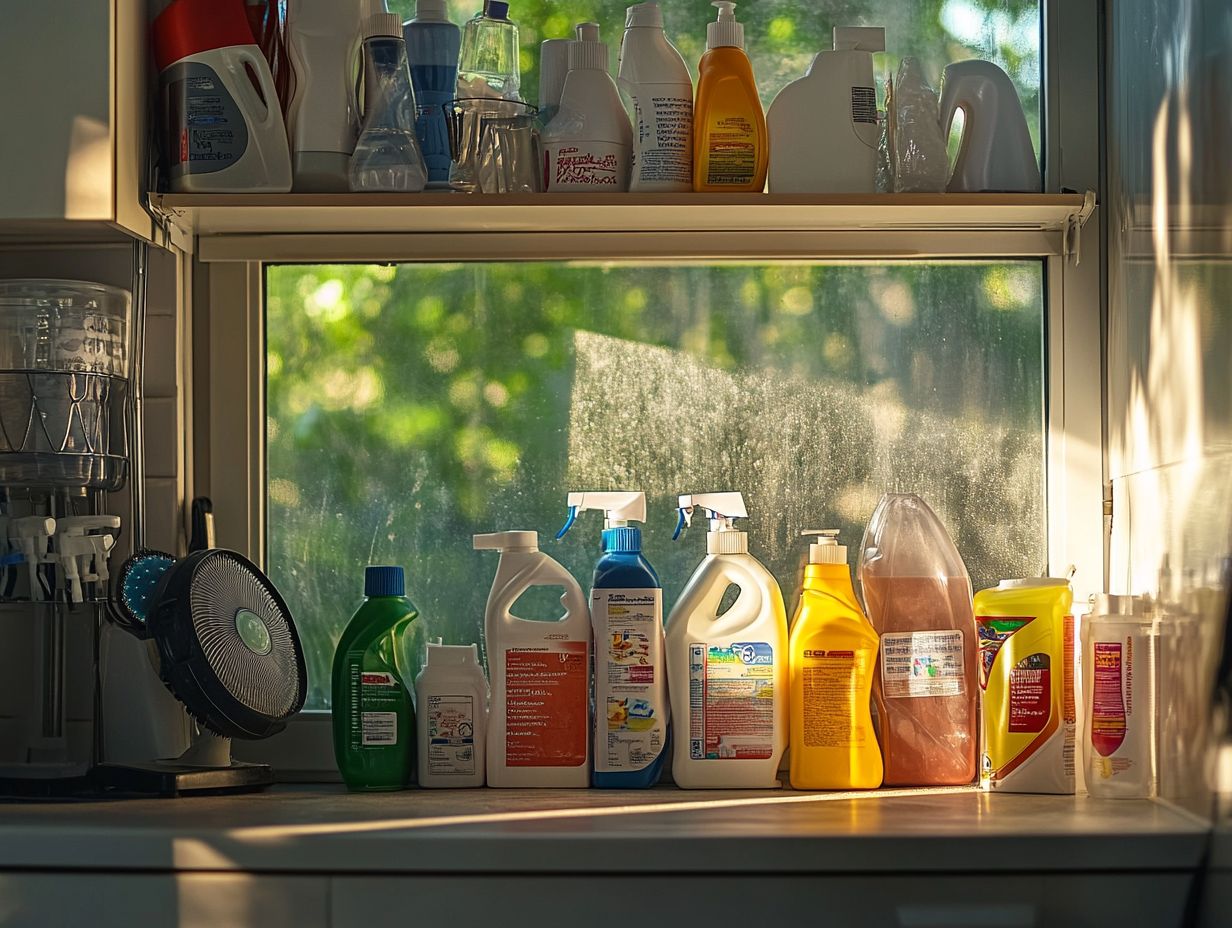
Implementing safe usage practices for cleaning supplies during the summer involves a thoughtful blend of proper handling, consistent adherence to a cleaning schedule, and diligent use of personal protective equipment, including gloves and masks.
By embracing these guidelines, you can ensure that your cleaning efforts are not only effective but also minimize the risk of exposure to any hazardous fumes or chemicals.
Prioritizing safety in your cleaning routine will lead to a healthier environment for you and those around you.
1. Read and Follow Instructions
Reading and following the instructions on cleaning products is essential for ensuring both safety and effectiveness. Each product comes with specific guidelines for proper application and dilution rates.
Adhering to these instructions can help you prevent accidents while maximizing the effectiveness of your cleaning supplies. Keeping a cleaning schedule can also help manage the use and storage of these products more effectively.
By meticulously examining the label, you gain valuable insights into safety measures that may be necessary, such as wearing gloves or ensuring adequate ventilation during use. For effective guidance on how to store cleaners in a family home, it’s crucial to follow proper practices. Misusing cleaning products can lead to harmful chemical reactions or health hazards, placing not only yourself but also children and pets at risk in your home.
Being aware of the warnings and precautions outlined on the label allows you to create a safer cleaning experience while also extending the life of the product by preventing wasteful overuse. This diligence ultimately contributes to a cleaner environment and a healthier home, ensuring that your cleaning efforts yield the best possible results.
2. Wear Personal Protective Equipment
Wearing the appropriate personal protective equipment, like gloves and masks, is absolutely essential when working with cleaning supplies, especially those containing hazardous chemicals. This precaution minimizes direct skin contact and reduces inhalation of toxic fumes.
Plus gloves and masks, don t overlook the importance of protective eyewear; it shields your eyes from splashes and irritating vapors. Nitrile or latex gloves are your best bet when handling potent disinfectants or solvents.
Investing in high-quality respirators can be crucial for situations involving strong odors or hazardous particles in the air. If you find yourself frequently cleaning in areas prone to spills, consider donning a heavy-duty apron to protect your clothing and skin from any accidental exposure.
By employing the right protective gear, you not only enhance your personal safety but also boost your confidence and efficiency while tackling cleaning tasks.
3. Use in Well-Ventilated Areas
Using cleaning supplies in well-ventilated areas is essential for minimizing exposure to harmful fumes and creating a safer cleaning environment. When you ensure adequate airflow, you’re dissipating any harmful chemicals released during the cleaning process, significantly reducing the risk of respiratory irritation or other health concerns.
To enhance ventilation while using these products, it’s wise to open windows and doors, allowing fresh air to flow freely. Employing fans can further optimize airflow, helping to push stale air out and invite in cleaner air.
In enclosed spaces, using exhaust fans or air purifiers equipped with activated carbon filters can greatly reduce potential risks. Poor ventilation heightens the chances of experiencing headaches, dizziness, or long-term respiratory issues, and it can also aggravate allergies.
Implement effective ventilation strategies to safeguard your health and well-being while ensuring that your cleaning process is both efficient and effective.
4. Dispose of Properly
Proper disposal of cleaning products is vital to prevent environmental contamination and minimize the risk of accidental exposure to hazardous chemicals. By following local regulations and guidelines for disposing of cleaning supplies, you ensure that you are managing waste in a safe and responsible manner.
Many cleaning products contain toxic ingredients that can pose serious risks to both humans and wildlife if not discarded properly. It s essential to check for labels that indicate whether a product is flammable, corrosive, or toxic, as these warnings often signal that special disposal procedures are necessary. Following COSHH regulations can help ensure that you are disposing of these products correctly.
For items that cannot be thrown away with regular trash such as bleach, aerosol sprays, or drain cleaners it is crucial to seek out community hazardous waste collection events or designated drop-off locations. By taking these additional steps, you contribute to environmental protection while supporting community health initiatives and promoting safe practices among those who may handle such materials.
Your Questions Answered!
How should I store cleaners safely during summer months?
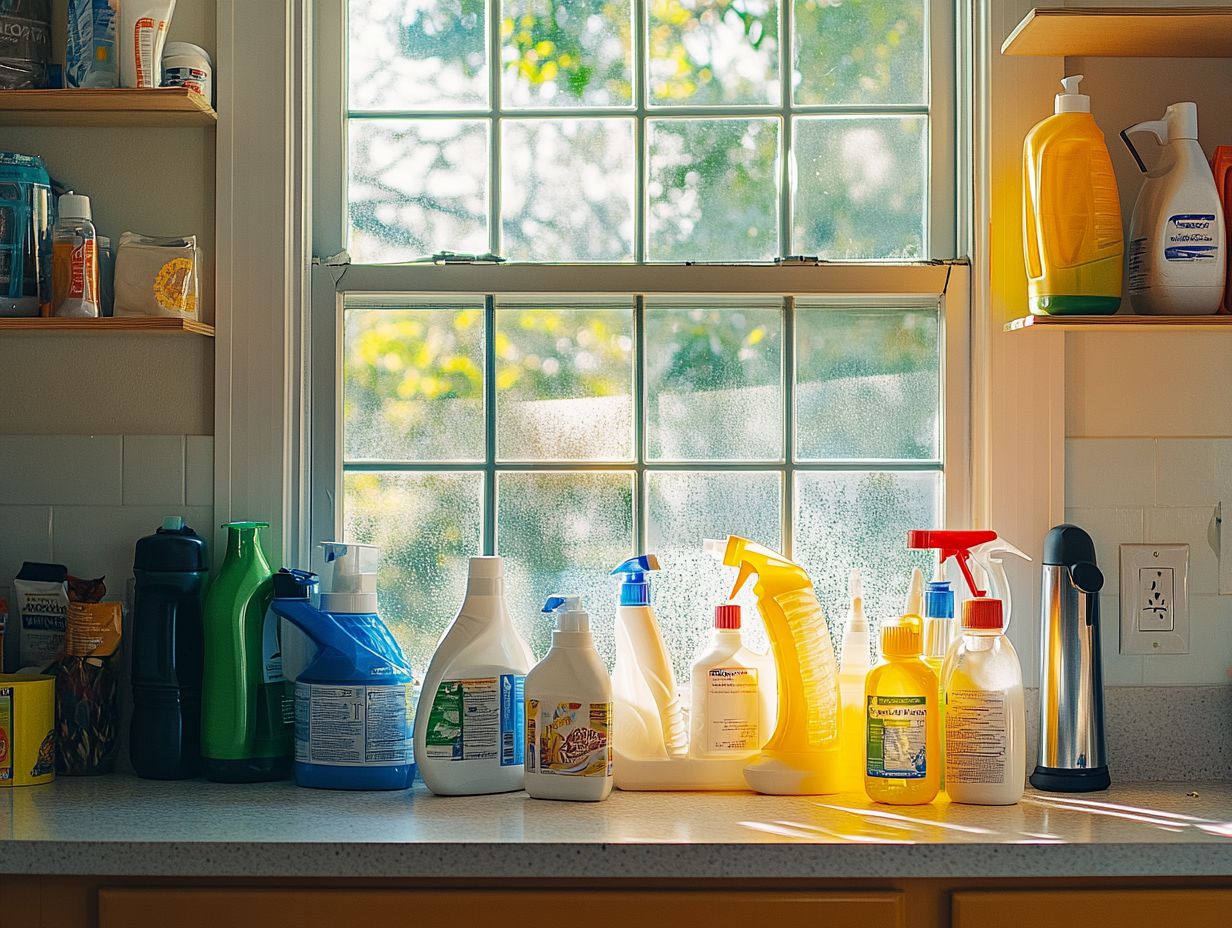
Cleaners should be stored in a cool, dry place away from direct sunlight. Avoid storing them in areas with high temperatures, such as garages or sheds, as this can cause them to break down and become less effective. Using vertical space and shelf storage can help maximize storage space while keeping them safe.
Can cleaners be stored in the refrigerator during summer?
No, cleaners should not be stored in the refrigerator. The moisture and temperature changes can cause them to spoil or lose their effectiveness. It is best to store them in a cool, dry place.
Are there any specific cleaners that need to be stored differently during summer?
Yes, cleaners that contain bleach should be stored separately from other cleaners. Bleach can react with other chemicals and create toxic fumes. It is best to store bleach-based cleaners in a well-ventilated area.
Should I keep cleaners out of reach of children during summer?
Yes, it is important to keep all cleaners, especially those that contain chemicals, out of reach of children. Make sure they are stored in a locked cabinet,
How long can I store cleaners during summer before they expire?
It is best to follow the expiration date listed on the cleaner’s packaging. However, if there is no expiration date, most cleaners can be safely stored for up to 2 years. After this time, their effectiveness may start to decrease.
What should I do if a cleaner spills or leaks during summer storage?
If a cleaner spills or leaks, it is important to clean it up immediately. Use protective gloves and follow the instructions on the cleaner’s label for proper disposal. If the spill is significant, contact your local waste management facility for guidance on how to dispose of it safely.
Don’t wait! Protect your health by improving ventilation now! Start organizing your cleaning supplies today for a safer home!

